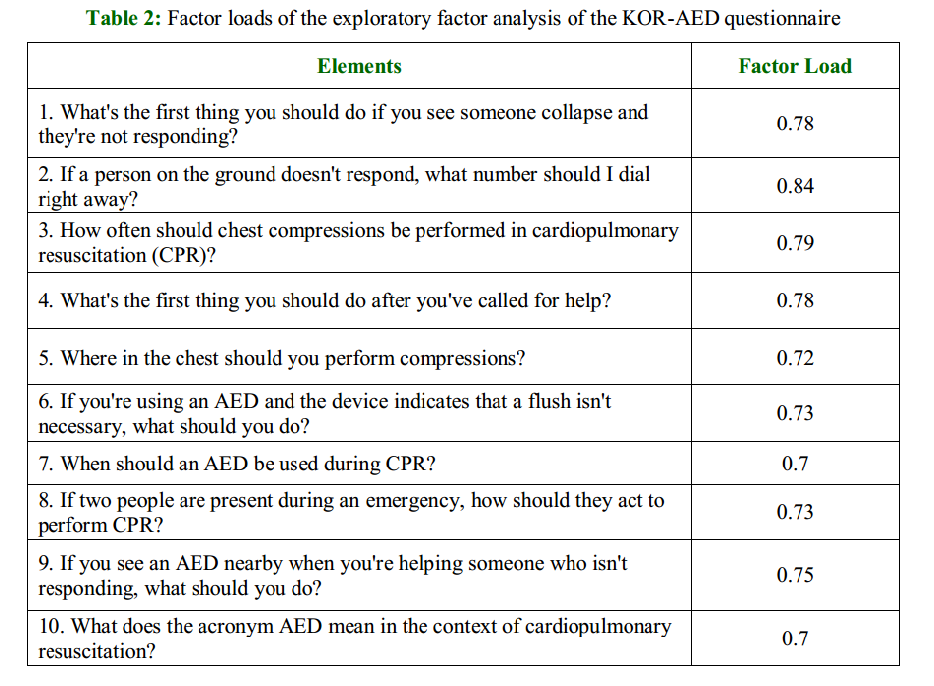Development validation and evaluation of the knowledge test on cardiopulmonary resuscitation and correct use of the automated external defibrillator in Asunción 2023
Main Article Content
Abstract
Introduction: in out-of-hospital cardiac arrest, early and efficient intervention through
cardiopulmonary resuscitation (CPR) maneuvers and the use of the automated external defibrillator
(AED) are the cornerstone for survival. Instruments that improve education would increase the
responsiveness of lay personnel.
Objectives: to develop, validate and evaluate a knowledge test on cardiopulmonary resuscitation and
correct use of the automated external defibrillator in Asunción during 2023.
Methodology: observational cross-sectional study, non-probabilistic sample for convenience of lay
personnel users of mass attendance centers in Asunción. An exclusive questionnaire was developed
on knowledge in cardiopulmonary resuscitation and the use of the automated external defibrillator
(KOR-AED) based on the chain of survival in out-of-hospital cardiac arrest. Content, construct, and
internal consistency were validated using expert opinion, factor analysis and Cronbach's alpha.
Results: a total of 200 lay people participated, mostly shopping mall customers, with a predominance
of men (63.5 %) (127), between 25-29 years old 28.5% (57). 61.5 % (123) had a university education,
75.5 % (151) had not related to health, 52 % (104) had prior knowledge of CPR, but 81.5 % (163)
did not. The test showed reliability and suitability for factor analysis (Cronbach's alpha 0.75, KaiserMeyers-Olkin; 0.78, Bartlett p<0.05). The questions covered the first three links in the chain of
survival, with items of medium to high difficulty. Women performed significantly better (p=0.04).
Conclusion: the KOR-AED test is a valid and reliable instrument to improve the education of the
layperson in CPR and use of the AED based on the chain of survival.
Article Details

This work is licensed under a Creative Commons Attribution 4.0 International License.
Usted es libre de:
- Compartir: copiar y redistribuir el material en cualquier medio o formato para cualquier propósito, incluso comercialmente.
- Adaptar: remezclar, transformar y construir a partir del material para cualquier propósito, incluso comercialmente.
- La licenciante no puede revocar estas libertades en tanto usted siga los términos de la licencia
Bajo los siguientes términos:
- Atribución: Usted debe dar crédito de manera adecuada, brindar un enlace a la licencia, e indicar si se han realizado cambios. Puede hacerlo en cualquier forma razonable, pero no de forma tal que sugiera que usted o su uso tienen el apoyo de la licenciante.
- Compartir igual: — Si remezcla, transforma o crea a partir del material, debe distribuir su contribución bajo la misma licencia del original.
- No hay restricciones adicionales — No puede aplicar términos legales ni medidas tecnológicas que restrinjan legalmente a otras a hacer cualquier uso permitido por la licencia.
References
Semeraro F, Greif R, Böttiger BW, Burkart R, Cimpoesu D, Georgiou M, et al. European
Resuscitation Council Guidelines 2021: systems saving lives. Resuscitation. 2021;161:80-97. doi:
1016/j.resuscitation.2021.02.008
Andelius L, Malta Hansen C, Lippert FK, Karlsson L, Torp-Pedersen C, Kjær Ersbøll A, et al.
Smartphone activation of citizen responders to facilitate defibrillation in out-of-hospital cardiac
arrest. J Am Coll Cardiol. 2020;76(1):43-53. doi: 10.1016/j.jacc.2020.04.073
Brooks SC, Simmons G, Worthington H, Bobrow BJ, Morrison LJ. The PulsePoint Respond
mobile device application to crowdsource basic life support for patients with out-of-hospital cardiac
arrest: Challenges for optimal implementation. Resuscitation. 2016;98:20-6. doi:
1016/j.resuscitation.2015.09.392
Cheng A, Magid DJ, Auerbach M, Bhanji F, Bigham BL, Blewer AL, et al. Part 6: Resuscitation
Education Science: 2020 American Heart Association Guidelines for Cardiopulmonary Resuscitation
and Emergency Cardiovascular Care. Circulation [Internet]. 2020;142(16_suppl_2):S551-79.
Available from: https://www.ahajournals.org/doi/full/10.1161/CIR.0000000000000903
McCarthy JJ, Carr B, Sasson C, Bobrow BJ, Callaway CW, Neumar RW, et al. Out-of-hospital
cardiac arrest resuscitation systems of care: a scientific statement from the American Heart
Association. Circulation. 2018;137(21):e645-60. doi: 10.1161/CIR.0000000000000557
Paraguay. Biblioteca y Archivo del Congreso de la Nación. Ley No 5578 / Uso obligatorio de
desfibrilador externo automático (DEA) en lugares de acceso público y privado de concurrencia
masiva. 2016. Available from: https://www.bacn.gov.py/leyes-paraguayas/4786/uso-obligatorio-dedesfibrilador-externo-automatico-dea-en-lugares-de-acceso-publico-y-privado-de-concurrenciamasiva
American Heart Association. Out-of-hospital Chain of Survival. 2020. Available from:
https://cpr.heart.org/en/resources/cpr-facts-and-stats/out-of-hospital-chain-of-survival
Borovnik Lesjak V, Šorgo A, Strnad M. Development, validation and assessment of the test on
knowledge about basic life support and use of automated external defibrillator among schoolchildren.
Scan J Trauma Resusc Emerg Med. 2019;27(1):114. doi: 10.1186/s13049-019-0683-6
Paraguay. Ministerio de Salud Pública y Bienestar Social. Se inicia formación en uso de
Desfibrilador Externo Automático. Asunción: El Ministerio. 2023. Available from:
Loma-Osorio P, Nuñez M, Aboal J, Bosch D, Batlle P, Ruiz de Morales E, et al. Proyecto Girona
Territori Cardioprotegit: evaluación del funcionamiento de los desfibriladores públicos. Rev Esp
Cardiol [Internet]. 2018;71(2):79-85. Available from: http://www.revespcardiol.org/es-proyectogirona-territori-cardioprotegit-evaluacion-articulo-S0300893217301550
Daud A, Mohammed Nawi A, Aizuddin AN, Yahya MF. Translation, cross-cultural adaptation,
and validation of the malay-version of the factors influencing community willingness to perform
cardiopulmonary resuscitation and use an automated external defibrillator questionnaire. Int J
Environ Res Public Health [Internet]. 2022;19(8):4882. Available from:
https://www.mdpi.com/1660-4601/19/8/4882
Chew KS, Liaw SY, Ahmad Zahedi AZ, Wong SSL, Singmamae N, Kaushal DN, et al.
Development, validation and translation of cardiopulmonary resuscitation and automated external
defibrillator training and placement bilingual questionnaire. BMC Research Notes [Internet].
;12(1):670. doi: 10.1186/s13104-019-4698-x
Nichol G, Aufderheide TP, Eigel B, Neumar RW, Lurie KG, Bufalino VJ, et al. Regional systems
of care for out-of-hospital cardiac arrest. Circulation [Internet]. 2010;121(5):709-29. doi:
1161/CIR.0b013e3181cdb7db
